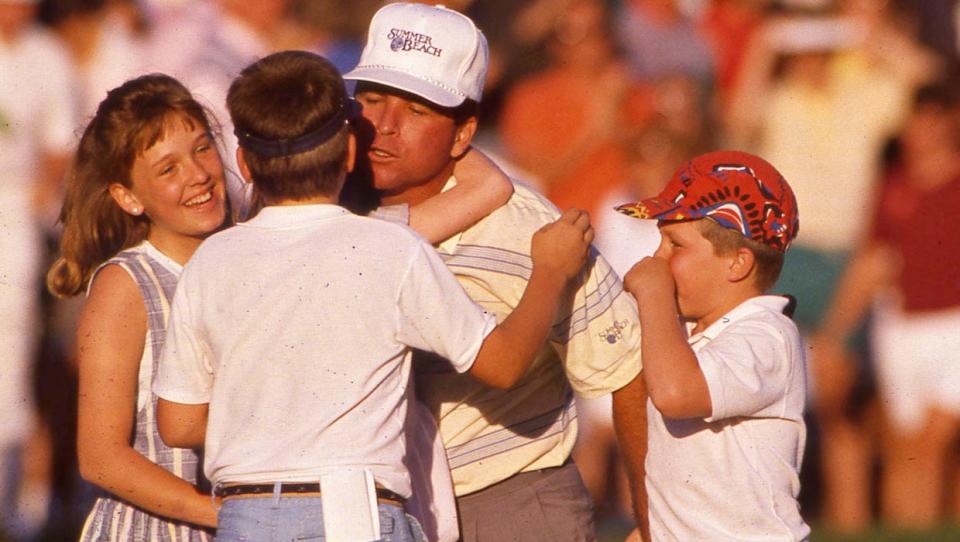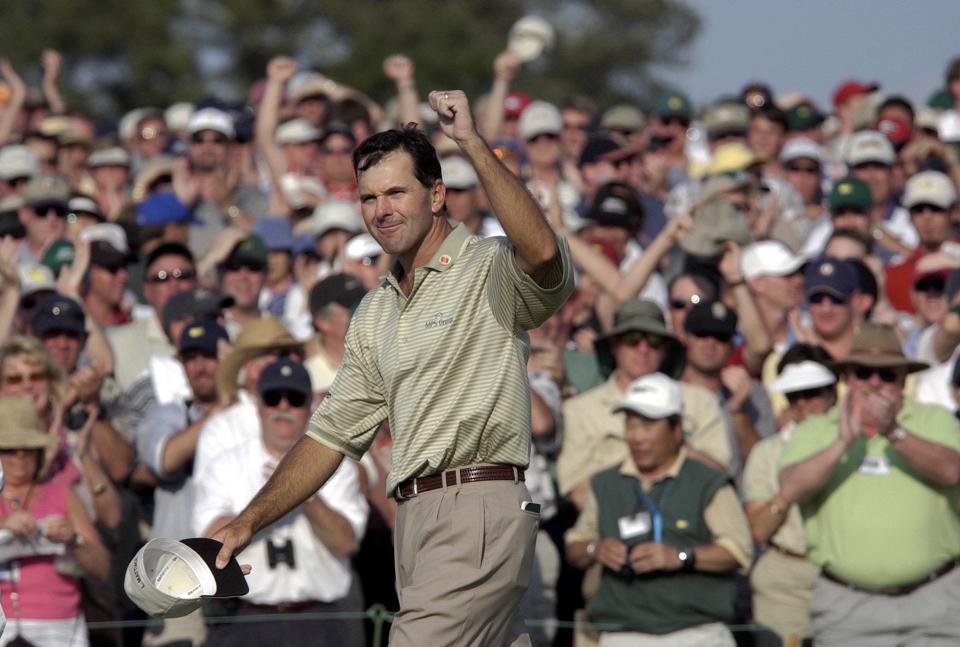Mark McCumber, Fred Funk and Len Mattiace have combined to win 20 PGA Tour events. McCumber and Funk won The Players Championship and Mattiace nearly did.
They combined to play in 124 major championships and had 10 top-10 finishes. All three had majors within reach late on a Sunday.
But to a man, they said the pressure of winning on the PGA Tour and competing in golf’s five biggest events don’t carry as much pressure as competing in a PGA Tour Final Stage qualifying tournament, or, in the more familiar parlance, PGA Tour Q-School — so named because passing the grind of the qualifying process also included classes in rules, finance, media relations and tour regulations.
Rickie Fowler praises his partner: Lexi Thompson “can hang with the boys”
The 2023 PGA Tour Q-School, presented by Korn Ferry, will be Thursday through Sunday, with 168 players competing in two rounds at the TPC Sawgrass Dye’s Valley and two rounds across A1A at the Sawgrass Country Club. The public can purchase tickets for $5 (the total amount will go to charity) for rounds at the Valley Course, with free parking.
The top five players, plus ties, will earn PGA Tour cards for the 2024 season, with the rest of the players in the no-cut event earning varying degrees of Korn Ferry Tour and PGA Tour Americas status.
Q-School is ‘the most pressure you can feel’
McCumber, Funk and Mattiace, all long-time First Coast residents (McCumber is a Jacksonville native) have combined to play in 17 Q-Schools. But unlike the glorious memories of victories or valiant efforts in majors, talking about Q-School brings back a flood of emotions that include anxiety, disappointment and at best, relief, with the ones that got them their PGA Tour cards.


“It’s the most pressure you can feel,” said Funk, an eight-time PGA Tour winner and the 2005 Players champion who went through the qualifying process five times. “On the PGA Tour, if you don’t win, you’ve got next week. If you don’t make it out of Q-School, you don’t have another week. You’re waiting another year.”
Mattiace, a two-time PGA Tour winner who also played in five Q-Schools, pointed out that players don’t get to win Tour events unless they get Tour status. When he was in his prime earning years on the Tour in the 1990s and into the first decade of the 21st century, missing out at Q-School meant playing on the Korn Ferry Tour, where the purses are about an eighth of a PGA Tour purse.
“It’s more pressure because guys don’t have anything to lean back on,” Mattiace said. “If you’re good enough to have won on the PGA Tour, or compete, you’ve got status. You’re disappointed with a missed cut or a missed opportunity but you know you’re playing somewhere next week.”
And McCumber, the Jacksonville native who won 10 times on the PGA Tour, topped by the 1988 Players, went through seven Q-Schools, including a time when there were two per year, one in June and another in December.
It also was a time where there wasn’t a developmental Tour, so McCumber’s options when he missed the cut for a card in a qualifier was to return to his family’s landscape architecture business and perhaps play on mini-tours such as the Space Coast Tour or the J.C. Goosie Tour.
“The pressure in Q-School is greater than any tournament you’ll ever play in,” he said. “Great players, like [World Golf Hall of Fame member] Curtis Strange miss it multiple times. I missed it six times and I still managed to have a career when I won double-digit victories. Q-School is a different kind of pressure. It’s all or nothing.”
Q-School will have fewer holes, fewer cards
This is the first year that the Tour has offered membership through the final-stage qualifier since 2012. Between 2013-2022, the qualifying process got players on the Korn Ferry Tour (formerly the Web.com, Buy.com, Nationwide, Nike and Ben Hogan Tour), and they had to earn their cards through a season of work.
That process still exists: the top 30 players on the Korn Ferry Tour points list earned cards for 2024. But there are now five more up for grabs and the numbers game is a lot tougher than before: when Mattiace and Funk played, for example, the top 25 at Q-School earned cards.


They and McCumber also had to play six grueling rounds — 108 holes, sometimes each more nerve-wracking as the longest week of their lives went on.
All three have war stories about making pressure shots to get their cards — or not.
Players mustered late heroics
“The Woodlands [in Houston] … the first time I made it I took about two clubs too many into the 18th green to avoid the trouble in front, and wound up 100 feet over the back of the green,” Funk said, recalling one of his best moments in a Q-School. “I needed two putts from there to make it on the number. I knocked the first putt to 5 feet, then made that one to get my card.”
Mattiace also had a pulse-pounding finish at The Woodlands, in 1992. He needed a par at the last to get his card on the number but pulled his drive into trees on the left.
“I had to do a Bubba Watson shot,” Mattiace said. “I hit this big, high hook, over the water and got on the green, about 50 feet from the hole. Then I hit the first putt 5 feet past and made that.”
McCumber’s first Q-School was in 1975 in Myrtle Beach, where more than 400 players were spread out on four courses, with only 13 cards up for grabs. He eventually played qualifiers at Pinehurst, the Bardmoor near Tampa and finally at the University of New Mexico golf course in Albuquerque.
McCumber was safely within the cut line for a card when he started his final round, parred the first seven holes, then made up for a poor drive at the eighth hole by making a 30-foot putt for par.
He realized, with a flood of relief, that he would get his card barring multiple disasters.
“When that putt at No. 8 went in it was a total release,” McCumber said. “I birdied 9, 10, 11 and 12 and it was easy street after that.”
McCumber finished second to medalist Wren Lum. Nine months later McCumber won the first of two titles at Doral and he never had to worry about Q-School again.
Q-school atmosphere is tense
Sometimes a heroic shot in Q-School can mean disaster for others. McCumber remembers a group of four or five players who were already finished with their final round at Pinehurst watching Jim Chance, playing in the final group at No. 18. The players were tied with Chance for the final qualifying spot and if he two-putted from 30 feet, they all got their cards.
Chance then dropped the putt for birdie, clinching the final spot all to himself and relegating the rest of those players to waiting for next year.
Mattiace said the atmosphere of a Q-School is vastly different from a PGA Tour event. The practice range, putting green and locker room banter are at a minimum and the tension rachets up every day.
“I don’t remember seeing guys throw up in the locker room but I remember having a lot of sleepless nights,” he said. “I’d be playing the shots in my head, over and over, get to sleep around 1 a.m. and maybe got two hours of sleep. It’s a lot of stress.”
Funk said golf is not a game at Q-School.
“It’s not fun … not fun at all,” he said.
What’s their advice? ‘Stay in the moment’
Since they played six-round Q-Schools for 25 cards, McCumber, Funk and Mattiace said the strategy under those circumstances might be different from this week’s conditions of competition, 72 holes for five cards.
That said, what was their advice?
“Stay in the present, one shot at a time, but don’t tell yourself, ‘all I have to do is finish fifth,'” McCumber said. “Set a goal of winning the tournament.”
Funk has a vested interest in the proceedings this week since his son Taylor is among the players vying for the card. Taylor Funk turned professional six years ago and has already made a noteworthy accomplishment, playing his final 11 holes at 7-under at the Kinderlou Golf Club in Valdosta, Ga., to advance to final stage on the number. Funk shot 66 in the final round and tied for 11th to advance
Taylor Funk also shot 60 in the final round of a PGA Tour Canada event earlier this year to make that tour’s championship and earned status on PGA Tour Americas.
Fred Funk said he doesn’t need to offer copious amounts of advice to his son, who is playing some of the best golf of his life.
“Taylor knows what he needs to do,” Funk said of his son. “You have to realize that if you’re at this stage, you’re playing well, so go out and trust it. Stay away from the big numbers, the doubles and triples. Those are what will kill you. Let the course come to you and let the scores come to you.”
Mattiace said players should try to visualize every shot on every hole.
“The power of the mind is very important,” he said. “Know how you want to play the holes but also know how to get out of trouble. Every one of these guys is a good player. Any of them can go out on any day, on either course and shoot 6-under. Just get out of your own way and let it happen.”
This article originally appeared on Florida Times-Union: Contending in majors still doesn’t carry the pressure of PGA Tour Q-School



